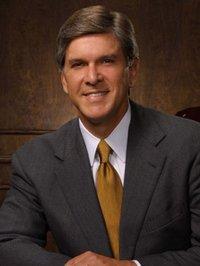, Michael J. Fox discussed the effects of his Parkinson’s, advocated for embryonic stem cell research, and addressed criticisms from Rush Limbaugh and other partisan hacks. Despite the tremors which dramatically affect his physical behavior and the ability for him to communicate as effectively as he’d like, it’s a powerful interview that puts the entire issue into perspective.
E.J. Dionne, who followed Fox on the show’s next segment, summarized it well: "If you put Michael J. Fox up against Rush Limbaugh in a public debate, which is in effect what you did today, what's happening all over the country, we know that except for Rush Limbaugh's conservative base, the vast majority will shift to the Michael J. Fox side. And I think that what Fox did is made the most compelling case for embryonic stem cell research, which is if you're against it, you also have to be against in vitro fertilization. And no one who is against it really wants to say that, because you're going to create these embryos that will be destroyed."
Stephanopoulos: Rush apologized — I guess he apologized for saying you were acting. He didn't call you, did he?
Fox: He would've had more qualifications at an AA meeting. No, you know, that's beside the point. It really isn't germane to the issue. It's funny because, what I'm talking about is about hope. It's about promise. It's about moving forward. It's a forward-looking attitude about what this country is capable of and what we can accomplish for our citizens.
And so if we get sidetracked into a dialogue about whether sick people have a right to display their symptoms in public, you know, that reaction. I think it was more disappointing, from the point of view of— The campaigns, like the [Republican Senate candidate Michael] Steele campaign, their spokesman said, "It was in poor taste," which really— I mean, I'm out here and I expect that. Being in the lead, I'll take some hits. And that's fine. I'm a big boy. Well, not height-wise.
I'm experienced enough and mature enough to take my licks. But I know the community was really hurt by it. And it really brings up the specter of, "Go away. Shut the windows. Shut the doors. Close the curtains, and suffer, and don't let us know," because it's a fearful response.
And what the irony is, is that those people that are being pitied or being asked to suffer in silence don't want to suffer, don't see themselves as pitiable, don't see themselves as victims — see themselves as citizens, participants in the process, and people with aspirations and hopes and dreams for the future. They are way more positive as a whole than what I've seen from the community that opposes them.
[Later]
Stephanopoulos: You mentioned the Steele campaign. Both the Steele campaign and the Talent campaign have said you're not being fair to them, because they want to expand stem cell research, too, they say, but it's adult stem cell research.
Fox: Right, and I agree with them on adult stem cell research. I mean, let's talk about what we agree on. I agree that stem cell research is fantastic; we should pursue it. I agree that we should have no human cloning. We're against that. We're against egg farming, that notion. We agree on all of that.
The only thing is, we would like to include embryonic stem cell research, which our scientists say has the best hope for cures and breakthroughs. See, we're in agreement. I think that when they say talk about not being fair, there has been, again, not as much focus on the content of the ad. It's really the appearance of the ad. But really, because all the statements are verifiable and to direct comparison, it is, in effect, an ad for their position. If you see the ad and you agree with their position, and there are people that do, then it should incentive you to vote for them.
[Later]
Stephanopoulos: Do you think there's any way to finally find common ground with people who do believe in the end that this is tampering with tiny lives?
Fox: Well, again, the point has been made that these lives are going to be thrown away, anyway. They are marked for destruction — thousands of frozen embryos that are a byproduct of in vitro fertilization. We have routinely, before this conversation started on stem-cell research, we have for years thrown them away.
And that's the other thing, you know, this idea of snowflake babies: We're in favor of that. The truth of the matter is that it is only going to account for a tiny fraction—
Stephanopoulos: Those are the embryos that are adopted and then brought—
Fox: Absolutely. Who would have a problem with that? That's fantastic. But it will, in the end, account for only a tiny fraction of those eggs. And so our point is that the pro-life position is to use that — what up to this point is waste, of literal waste that is going to be thrown away — use it to save lives and to ensure lives for the future. I
mean, they talk about unborn. Unborn kids are going to be born with diabetes.
People are going to be dealing with a genetic predisposition to Alzheimer's or to Parkinson's or kids that are going to be injured, have spinal cord injury. That those kids may be born into a world that has the answers for that. That's our position.
[Later]
Stephanopoulos: One of the things he says is that when you're talking about all these cures, you're giving people false hope and that it's cruel.
Fox: It's so funny. What is crueler, to not have hope or to have hope? And it's not false hope. It's a very informed hope. I mean, it's hope that's informed by the opinion of our leading scientists, almost to the point of unanimity that embryonic stem cells, because they're pluripotent, because they have the capacity to be anything, and, are truly— Will [it] be a straight path to victory? Probably not. Probably you'll have stutter steps along the way.
In fact, they just did some work where they found that it actually relieved the symptoms of Parkinson's in one test, but there some residue, some tissue residue that built up, which is not ideal. But two steps forward, one step forward, one step back, you know, it's a process, it's how this country was built. It's what we do, you know. It seems to me that in the last few years, eight, 10 years, we've just stopped, we've become incurious and un-ambitious.
And hope, I mean, hope is— I don't want to get too corny about it, but isn't that what the person in the harbor with the thing—? It's about hope. And so to characterize hope as some sort of malady or some kind of flaw of character or national weakness is, to me, really counter to what this country is about.
Stephanopoulos: You're supporting it through your foundation. A lot of states are supporting it. What do you say to those who say, "You know, we don't need the federal government to get in the middle of this right now, and it's too divisive an issue?"
Fox: Well, the federal government has to be involved, because on one level, you talk about limitations; it's not just a matter of the stem cells being limited, but the restriction on federal funding. If you have an institution, a facility that can do this kind of work and it receives any federal funding at all, you lose that if you do, if you take a cell out of a Petri dish on government property. So you have to have duplication of facilities.
So now our resources are going into scientists having to duplicate federal facilities at enormous expense in order to do the most rudimentary work with stem cells, with embryonic stem cells. You have researchers that can't get funding. And so you have young researchers that are not going into the field. It's the iterations of limitation are endless. So you say: Why can't the private sector get involved? Because they have to duplicate the entire resources of the federal government in order to do it. It's just not practical.
[Later]
Fox: ...You know, that's the other notion that was put out there, was that I somehow was recruited by the Democratic Party.
Stephanopoulos: Democratic shill, I think was the word.
Fox: Democratic shill, yes. I have to look up shill in the dictionary. I think it has something to do with supporting someone whose beliefs you don't believe in for ulterior reason or something.
But, yeah, no, I'm not a shill for the Democratic Party. I approached them. I sat down to find out what candidates are pro-stem cell in races where they're opposed by anti-stem cell candidates. And I had no predisposition toward Democrats or Republicans. It'd be fine with me either way.
In fact, a Republican candidate who's pro-stem cell would be someone I'd really like to talk to. And in fact in the past I've supported, I've done commercials for Arlen Specter, who is a very aggressive pro-stem cell champion. And I know that there are others, you know. There are people like Orrin Hatch and Danforth and others who've thought about it, weighed it really carefully and found that its pro-life possibilities aren't counter to their previous positions. This is a pro-life position, and this is the responsibility of our leadership to take it down this path. It will help Americans.

 To the impoverished mining families of Appalachia, it may have initially seemed awkward to bear their soul to a young millionaire senator from New York, but that feeling soon faded. For once, someone was there to listen; someone who embodied compassion and sincerity and strove to not only speak, but to act on their behalf. And he had the ability and influence to make good on his promises. Far from a phony, he was a saint. He became an advocate for those with no voice of their own; a true champion of the people.
To the impoverished mining families of Appalachia, it may have initially seemed awkward to bear their soul to a young millionaire senator from New York, but that feeling soon faded. For once, someone was there to listen; someone who embodied compassion and sincerity and strove to not only speak, but to act on their behalf. And he had the ability and influence to make good on his promises. Far from a phony, he was a saint. He became an advocate for those with no voice of their own; a true champion of the people.









